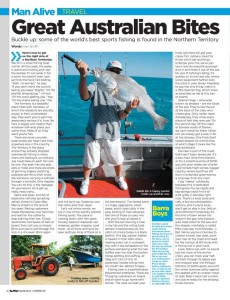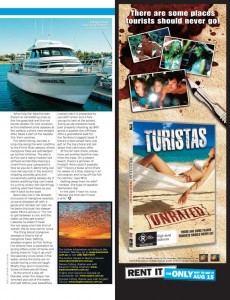 Great Australian Bites
Great Australian Bites
A stupendous trip to Darwin and beyond, one of the world’s great fishing spots, for Alpha magazine, in about 2006. Didn’t catch a single fish worth the name, mind. Photographer was Smith, Ivan.
________
Here’s how to get on the right side of a Northern Territorian. We sit in a small fishing boat not far off the coast; the water is warm and inviting and I ask the skipper if I can jump in for a swim. He doesn’t even look up from the hook he’s baiting. “Yeah, no worries,” he says. “If you don’t mind the current taking you away.” Righto. “Or the jellyfish stinging you.” Uh-huh. “Or the crocs getting you.” Yup. “Or the sharks eating you.” OK.
The Territory is a beautiful place filled with horribles, of which the residents are secretly proud. In their understated way, they want you to get how awesomely serious it is. How life here is bigger and nastier than whatever soft-arse place you come from. Most of all, they want you to fish.
 There are more concrete boat-ramps per head here than anywhere else in the country. The Territory is the place where they actually stopped commercial fishing in many rivers and harbours, so ordinary Joe could take on each fish one by one. You walk into any pub, café or hotel and there are shots of grinning anglers clutching outsized sea-life to their chest, like someone carrying a suitcase through a turnstile. Only happier. You can do this, is the message. All you have to do is get up really, really early…
There are more concrete boat-ramps per head here than anywhere else in the country. The Territory is the place where they actually stopped commercial fishing in many rivers and harbours, so ordinary Joe could take on each fish one by one. You walk into any pub, café or hotel and there are shots of grinning anglers clutching outsized sea-life to their chest, like someone carrying a suitcase through a turnstile. Only happier. You can do this, is the message. All you have to do is get up really, really early…
Spick and span, and full of expensive vehicles sprouting aerials, Darwin’s Cullen Bay Marina at 6am is the land of the dead. Paying customers drape themselves over benches and wait for the coffee to stop burning their lips. Chirpy deckhands cart boxes of bait on board, then cart you on board. Blink and you’re out through the lock in a 4m swell. Blink again and the sun’s up. Suddenly you feel more alive than dead.
Let’s not mince words: we are in one of the world’s premier fishing spots. The place is coming down with fish: giant trevally, Spanish mackerel, red emperor, golden snapper, coral trout… All of them willing to be your suitcase. King of them all is the barramundi. The famed barra is a huge, aggressive, smart beast, which lurks lazily in the easy picking of river estuaries. Get one of those on your line and you’ll know all about it.
With the sun burning a hole in my hat and the rolling boat parked in seasickness jail, the catch of choice today is a black jewfish. This big, solemn battler is hauled in from 40m down, making every run in a straight line, until it lies exhausted on the surface wondering what the hell. Gaffed over the side, the jewfish hangs spitting and puffing, all 15kg and 1.2m of him, its expanded insides lolling from his mouth like Jabba’s tongue.
Fishing here is a sophisticated, streamlined enterprise. There are 12 paying customers on board, and all want to go home with stories. The crew will bait your hook (pilchard will get your classy fish, rubbery squid for those who’ll eat anything), untangle your line, serve you lunch and do everything except dive in and tickle it out of the sea for you. If nothing’s biting, it’s quickly on to the next site, where sonar equipment further puts the odds in your favour. Needless to say, the only thing I catch is a little Spanish flag, which looks as surprised as me at this turn of events.
Spanish flags – otherwise known as stripeys – are the idiots of the sea. They’re like the kid at the back of the class who chews glue. Only, rather more damagingly, they chew every piece of bait they ever see. On the second day, off the coast of Dundee south of Darwin, we can’t move for them. Other fish can barely get a look in for all the stripeys. One finds itself reeled aboard for the third time, at which stage it looks like the pub dartboard.
Dundee is part of the coast that hasn’t been tamed yet. It’s a two-hour drive from Darwin, or for a collective price of $750, you and your mates can charter a 20-minute flight across rugged country, where bushfires still burn in untended glow-worms, a long way from any road.
I say “mates” advisedly, because this is dedicated fishingville. Fly-by-nights and tag-alongs could find it all a bit gritty in Dundee right now. There’s a local store and café, a few accommodation options, and if you’re lucky you’ll get to stay in the JimLori airconditioned home-stay. It’s the kind of town where the mayor’s the guy who tractors your boat down to the sea, and the skipper, inevitably, is called Mick (you see, from Dundee…). But mainly you’re in Dundee to charter a small, fast boat, point your rear at the coast and head for the horizon at 60 knots with a fishing rod in your hand.
Here, 50km out, with no sound but the clank of the anchor chain, you can hook your half-pilchard through its glassy eye and unspool your line through fathoms of bottle-green sea until the sinker bounces softly against the seabed with an unseen cloud of dust. Reel it back half a notch, and you’re ready for the stripeys, those morons.
When big fish take the bait, there’s an exhilarating snap as the line goes taut and the rod bends double. On one occasion, as the shattered prize appears at the surface, a shark rises straight after, takes a dart at the hapless fish, then disappears.
For barra fishing, we take a long ride along the wild coastline to the Finnis River estuary, where mangrove trees are submerged up to their britches. The aim is to flick out a many-hooked lure without accidentally tearing a chunk from your companion’s face as you do it. Barra hang out here like big kids in the precinct, shouting at pretty girls and occasionally eating passers-by. If there’s anything they can’t resist it’s a shiny, silvery fish-like thingy, darting past their faces as they reel it back to the boat.
Barra also live in the streams and pools of mangrove swamps, so we’re dropped off with a guide and handed our rods. As he backs the boat into deeper water, Mick’s advice is: “Try not to get between a croc and the water, as they get scared.” I assume he doesn’t mean the run-away-and-hide kind of scared. We all look out for crocs.
The thing about mangrove swamps is they’re full of mangrove trees. Getting amateur anglers to flick fishing line around here is equivalent to giving kittens a ball of twine and asking them to “tidy it up a bit”. Occasionally a lure lands in the water, where the barra are no doubt having a rare old laugh. Mostly they land in branches. Some of them are still there.
At the end of a day off Dundee, when the mayor has winched you out of the water, and just before your beautifully cooked catch is presented to you with lemon and a fork, you go to look at the sunset. Along as-yet unpaved roads, past property shooting up $40 grand a quarter, the cliff-tops offer a grandstand seat for the Territory’s biggest asset. If there’s a dud sunset here, you get on the big phone and ask about that cash-back offer.
At the far dark shore, smoke from yet another bushfire rises from the trees. On a distant beach, there’s a glimmer of firelight. Who could it possibly be? “There’s a bloke who’s there for weeks at a time, staying in an old caravan and living off the fish he catches,” says Mick.
Getting away from his wife? I venture. The type of question Territorians like.
In the dark I hear his voice. “Blokes like that don’t have a wife.”
________
See this as higher-res PDFs: